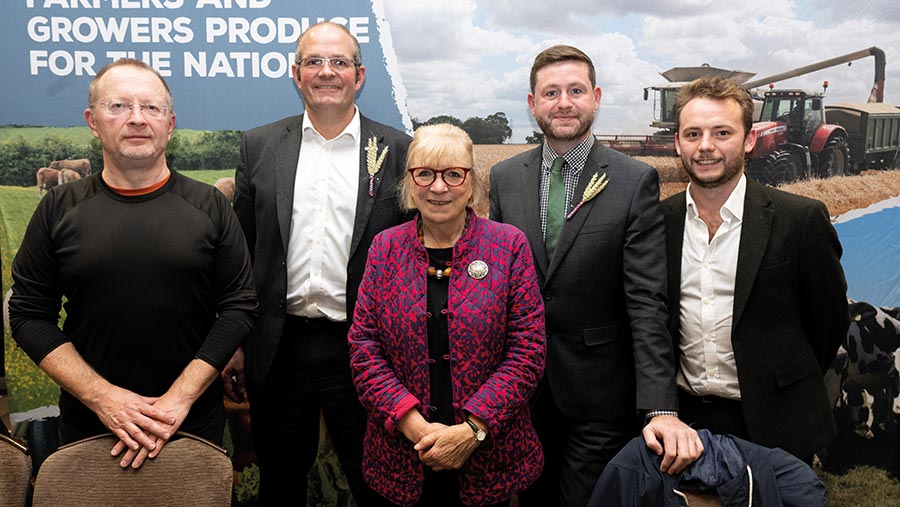Trust in ELM has eroded, says shadow Defra secretary McMahon
 Jim McMahon (second right) addressed an NFU event at the Labour conference © NFU
Jim McMahon (second right) addressed an NFU event at the Labour conference © NFU Shadow Defra secretary Jim McMahon has said trust in the Environmental Land Management (ELM) scheme has eroded, as he pledged Labour would deliver an agri-environment scheme farmers could have confidence in.
Mr McMahon said the Labour Party supported the principle of ELM, which is designed to pay farmers for producing food while caring for the environment, but he criticised its rollout as not being “anywhere good enough”.
Speaking at the NFU’s fringe event at the Labour Party conference in Liverpool on Monday 26 September, Mr McMahon insisted his party would deliver a more comprehensive scheme that would bring more farmers on board.
See also: Defra rejects claims its ELM scheme could be axed
There is concern within the industry that ELM is under-funded and lacks options, such as for upland farmers, which could see businesses driven to the wall as the Basic Payment Scheme is phased out.
This has reportedly led to a poor take-up of the Sustainable Farming Incentive, the first component of Defra’s flagship post-Brexit agri-environment scheme.
Mr McMahon told Farmers Weekly after the event: “Where we think the government could do far more is to genuinely co-produce a scheme that brings together the farming community, the nature, environment and animal welfare movement to co-produce it together.
“It [ELM] hasn’t had the capacity that is needed to make sure that Defra have enough people to go out there to support farmers and collate bids and put them together, and it hasn’t had a clear framework, so people don’t know what they are bidding for.”
Given the cost-of-living crisis and soaring input prices farmers are facing, Mr McMahon said an extension to direct payments made sense.
“No more cost to government – the money was already allocated but it has not been drawn down because ELM hasn’t been taken up. That doesn’t mean we are any less ambitious for nature, it is just the reality of where we are.”
On land use, Mr McMahon said: “You’ve got to have a plan and a structure about how we would use the land that we’ve got. There’s a limited resource to make sure we are using the land for the right purpose and the right location.
“We are absolutely committed to have a scheme that bridges farming support and supporting the natural environment.”
A Defra spokesman responded to Labour’s criticism, saying: “As set out in the Growth Plan, we will be looking at the frameworks for regulation, innovation and investment that impact farmers and land managers, to make sure that our policies are best placed to both boost food production and protect the environment.
“This includes looking at how best to deliver the Environmental Land Management schemes to see where and how improvements can be made, and we will continue to work closely with the sector to ensure these are designed and delivered in their best interests.”
Rural vote crucial to Labour’s election prospects
The Labour Party has been warned it must secure the trust of rural voters if it is to win the next general election.
Chris Curtis, head of political polling at insight agency Opinium, said rural communities were an important voter group that must not be overlooked by Labour as it attempted to end 12 years of Conservative rule.
“The problem Labour fundamentally has got is it has [only] two MPs that really represent the 124 most rural constituencies in this country,” Mr Curtis told the audience at the NFU’s fringe event at the Labour Party conference in Liverpool.
“It needs to be starting to gain some more of those seats among rural voters who traditionally struggled to trust the Labour party to defend their issues.
“The Labour party cannot see rural communities as people that are out of reach for them or not part of their voting coalition.”
Mr Curtis added that there was a greater awareness of rural communities among all voters.
“Even a lot of voters who don’t live in these rural areas now appreciate the importance of rural communities. Forty per cent of people think politics and politicians pay too little attention to rural communities in the UK.”
Labour has surged to its largest poll lead over the Conservatives in more than two decades. A YouGov poll for The Times on Monday 26 September put Labour 17 points clear of the Tories — a level of support not seen since Tony Blair won his landslide victory in 2001.
